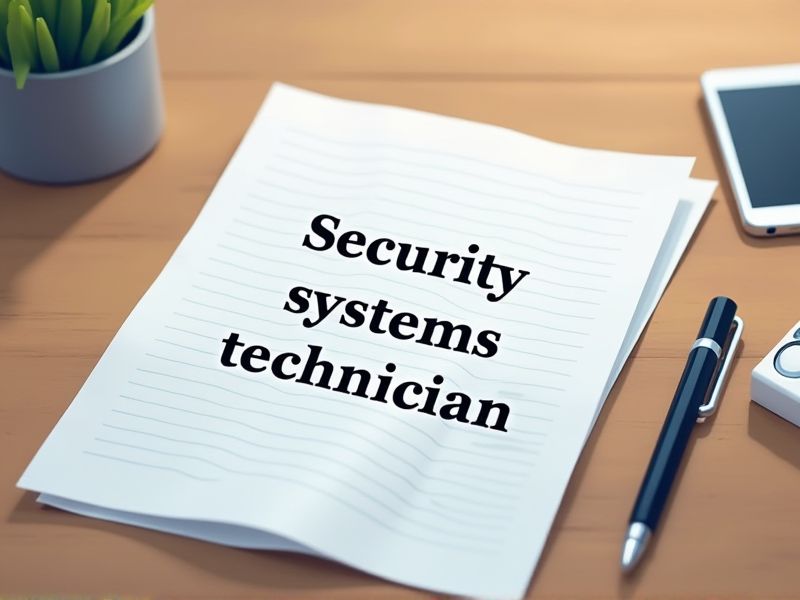
Security systems technicians ensure the safety and reliability of security infrastructure, which requires specialized knowledge and skills. Certifications validate a technician's expertise and proficiency in various technologies and systems. Employers often seek certified professionals to ensure compliance with industry standards and enhance trust in their security systems. Here are some key certifications that can be essential for a career as a security systems technician.
CompTIA A+ Certification
Having a CompTIA A+ Certification equips a security systems technician with essential knowledge of computer hardware and software, which is foundational for troubleshooting security system issues. This certification covers a wide range of technical skills, ensuring that technicians can handle various components and networks often integrated into security setups. Employers value this certification as it demonstrates the technician's ability to understand and implement best practices in IT and security maintenance. The CompTIA A+ serves as a benchmark for technical proficiency, enhancing a technician's employability and career advancement prospects in the competitive security industry.
CompTIA Network+ Certification
Possessing a CompTIA Network+ Certification equips a Security Systems Technician with foundational networking skills essential for understanding and managing network infrastructure, crucial for securing systems. It provides a comprehensive understanding of network protocols and topologies, which aids in implementing effective security measures. This certification demonstrates proficiency in diagnosing and troubleshooting network issues, reducing potential downtime and vulnerabilities. Employers often seek this certification as a verification of a technician's competence in maintaining secure and reliable network systems.
CompTIA Security+ Certification
CompTIA Security+ certification equips security systems technicians with foundational knowledge in crucial areas like threat management and network security, which enhances their ability to protect systems effectively. Organizations often prefer or require this certification as it aligns with industry standards, thereby validating a technician's competencies in cybersecurity. The certification also boosts a technician's employability and potential earning capacity, making them more competitive in the field. Security threats constantly evolve, and ongoing certification helps technicians stay updated on the latest security protocols and techniques.
Cisco Certified Network Associate (CCNA) Security
The CCNA Security certification provides foundational knowledge of network security, which enhances a technician's ability to protect systems against unauthorized access and vulnerabilities. Understanding network threats and implementing security measures enable technicians to effectively secure data transmission. Proficiency in configuring and monitoring secure network infrastructures is crucial for maintaining robust defenses in dynamic IT environments. The certification ensures adherence to best practices and standards, enhancing job performance and career prospects in security systems management.
Certified Information Systems Security Professional (CISSP)
The CISSP certification is essential for security systems technicians because it validates their proficiency in designing and implementing robust security protocols. It significantly increases a technician's credibility and trust among employers, leading to potentially better job opportunities and salary prospects. The certification equips technicians with a comprehensive understanding of various security domains, enhancing their ability to protect enterprises against cyber threats. A CISSP-certified technician can effectively support an organization's compliance with industry regulations, contributing to overall security posture improvements.
Certified Information Security Manager (CISM)
Organizations face increasing cybersecurity threats, which necessitate robust information security programs managed by professionals. A Certified Information Security Manager (CISM) provides the expertise to design and oversee such programs, ensuring alignment with business goals. Security systems technicians benefit from CISM guidance by implementing effective security measures tailored to organizational needs. CISM certification validates a professional's capability in managing and governing information security, enhancing the organization's overall resilience.
CompTIA CySA+ Certification
CompTIA CySA+ Certification enhances a security systems technician's ability to identify and address vulnerabilities efficiently. Employers often seek certified professionals, as the credential signifies verified expertise in threat management. The certification's focus on behavioral analytics equips technicians to proactively combat advanced persistent threats. Staying certified ensures continuous learning, crucial in the rapidly evolving field of cybersecurity.
Certified Ethical Hacker (CEH)
A Certified Ethical Hacker (CEH) provides a comprehensive understanding of how malicious hackers operate, equipping security systems technicians with the necessary skills to anticipate and mitigate potential threats. Certified professionals demonstrate a proficiency in identifying vulnerabilities within an organization's infrastructure, crucial for maintaining robust security. By simulating real-world cyber attacks, CEH training enhances a technician's ability to devise effective countermeasures. Organizations increasingly require CEH-certified individuals due to the rising complexity and frequency of cyber threats, ensuring industry's demand for such expertise remains high.
Physical Security Professional (PSP)
A Physical Security Professional (PSP) significantly enhances the effectiveness of security systems by providing strategic expertise in risk assessment and management. Their in-depth knowledge aids security systems technicians in designing and implementing solutions tailored to specific environmental threats, reducing vulnerabilities. By collaborating with technicians, PSPs ensure that security measures are not only technically sound but also aligned with organizational goals. Consequently, this partnership leads to a more robust and comprehensive security infrastructure.
NICET Certification in Electronic Security Technology
Obtaining NICET Certification in Electronic Security Technology builds credibility for security systems technicians by validating their skills and knowledge in the field. This certification increases a technician's job prospects, as many employers prefer or require certified professionals. Knowledge gained through the certification process equips technicians with up-to-date practices and standards, enhancing job performance. Certification can also lead to higher earning potential due to the specialized skills and expertise recognized in the industry.
Summary
You enhance your professional credibility by obtaining certifications as a Security Systems Technician. Earning certifications often leads to increased job opportunities and higher salary potential. The specialized training associated with certifications equips you with advanced skills, improving your problem-solving capabilities in the field. Certified technicians are more likely to gain trust and establish long-term client relationships, ultimately contributing to job satisfaction.
